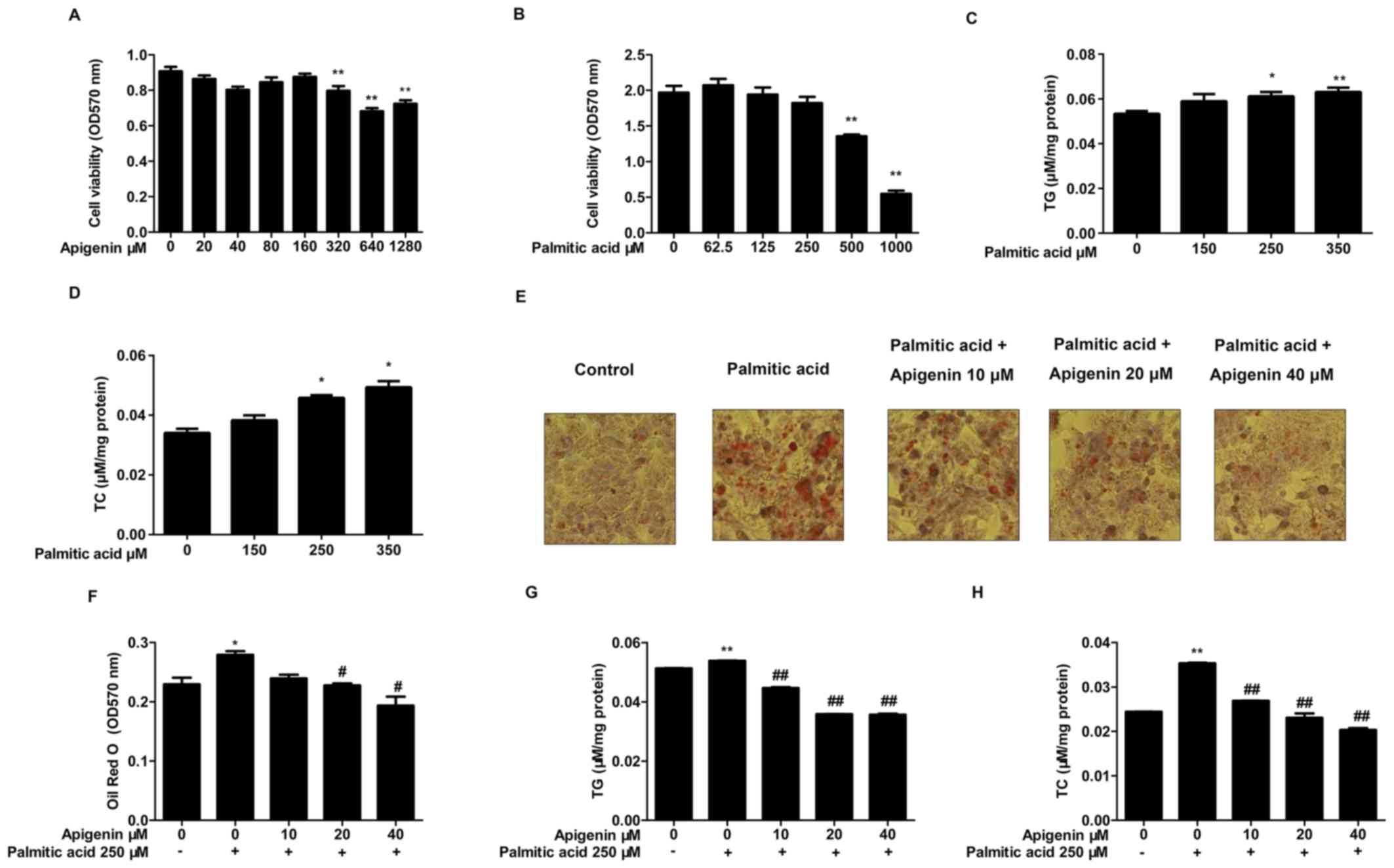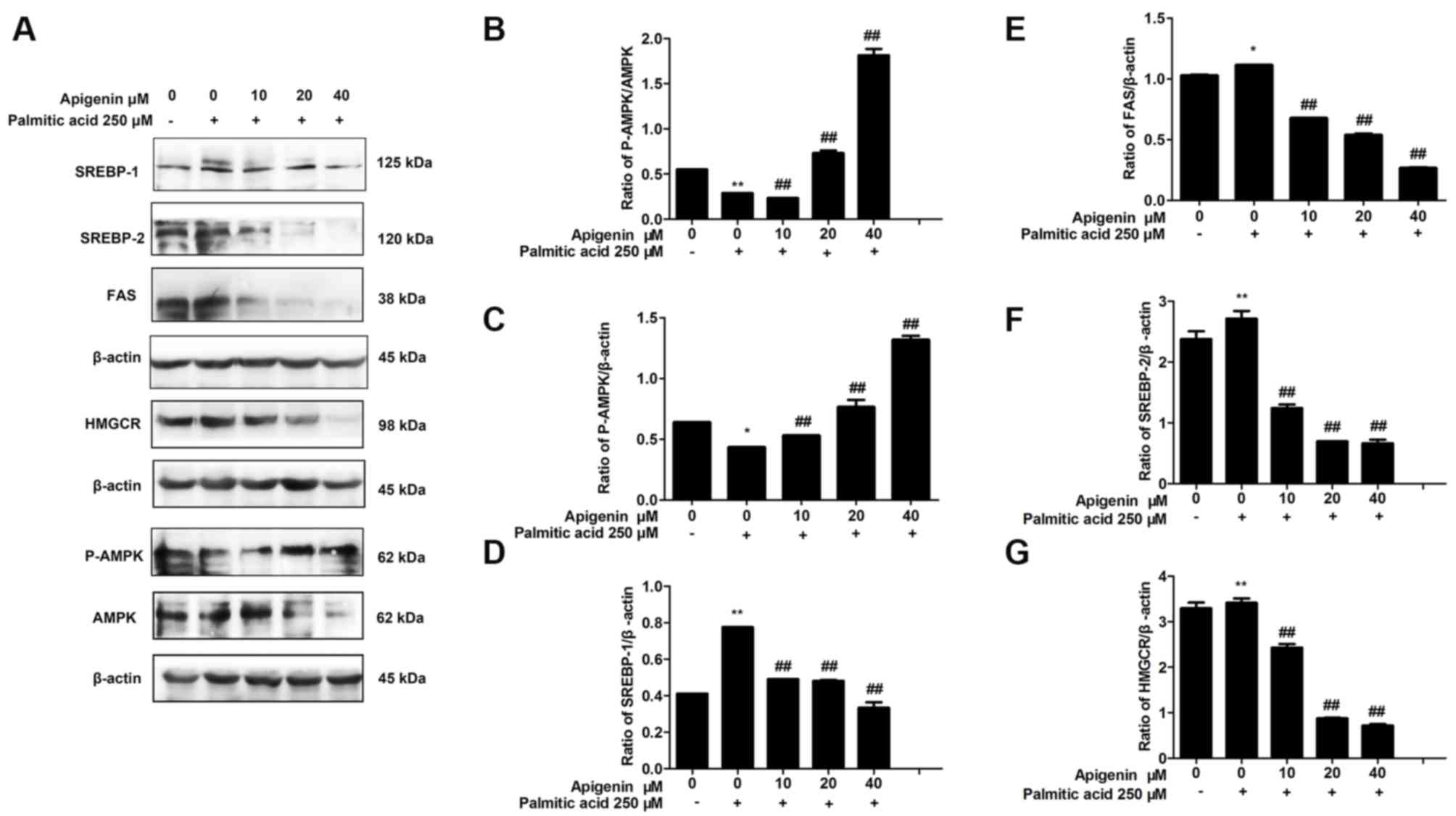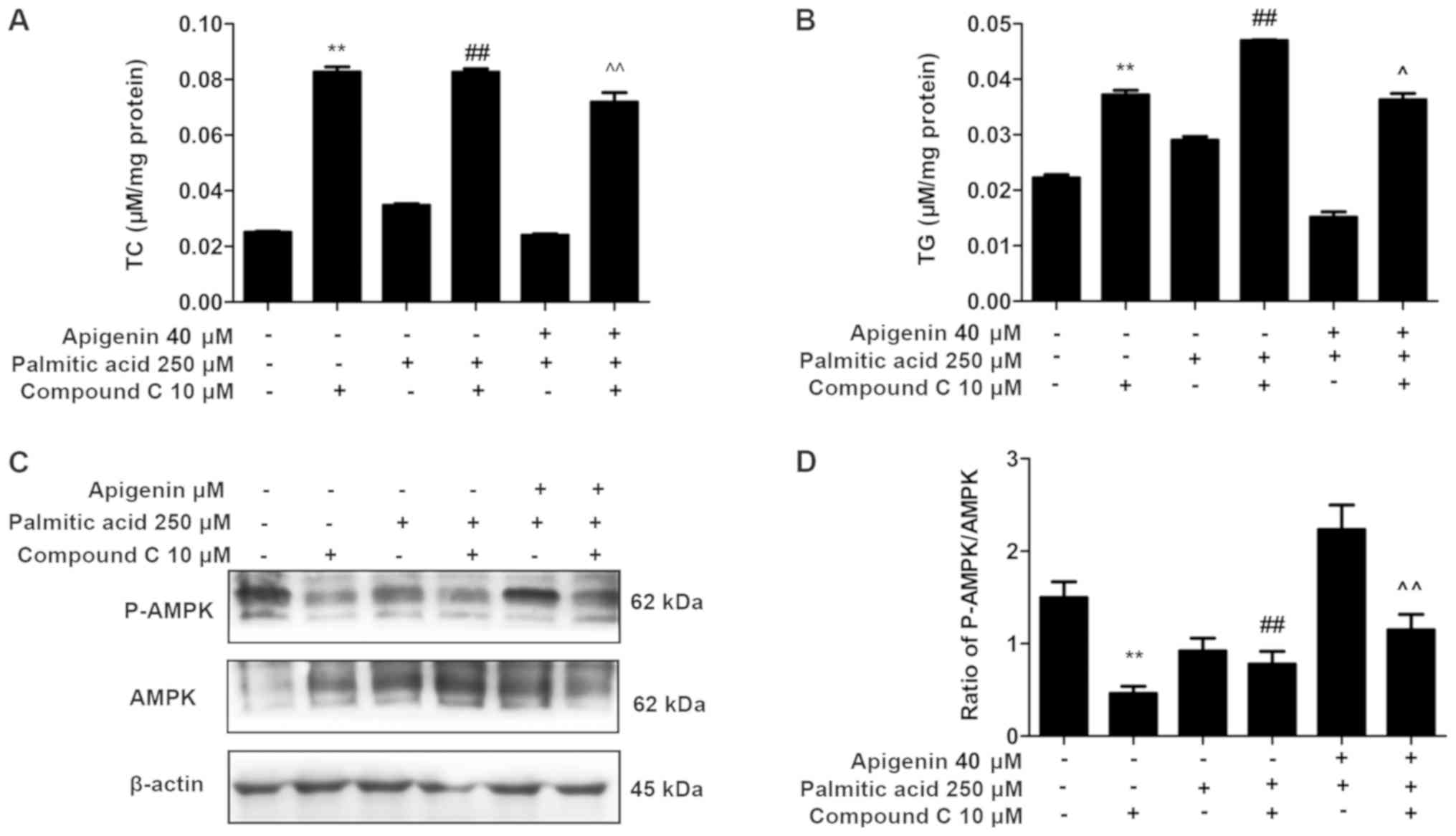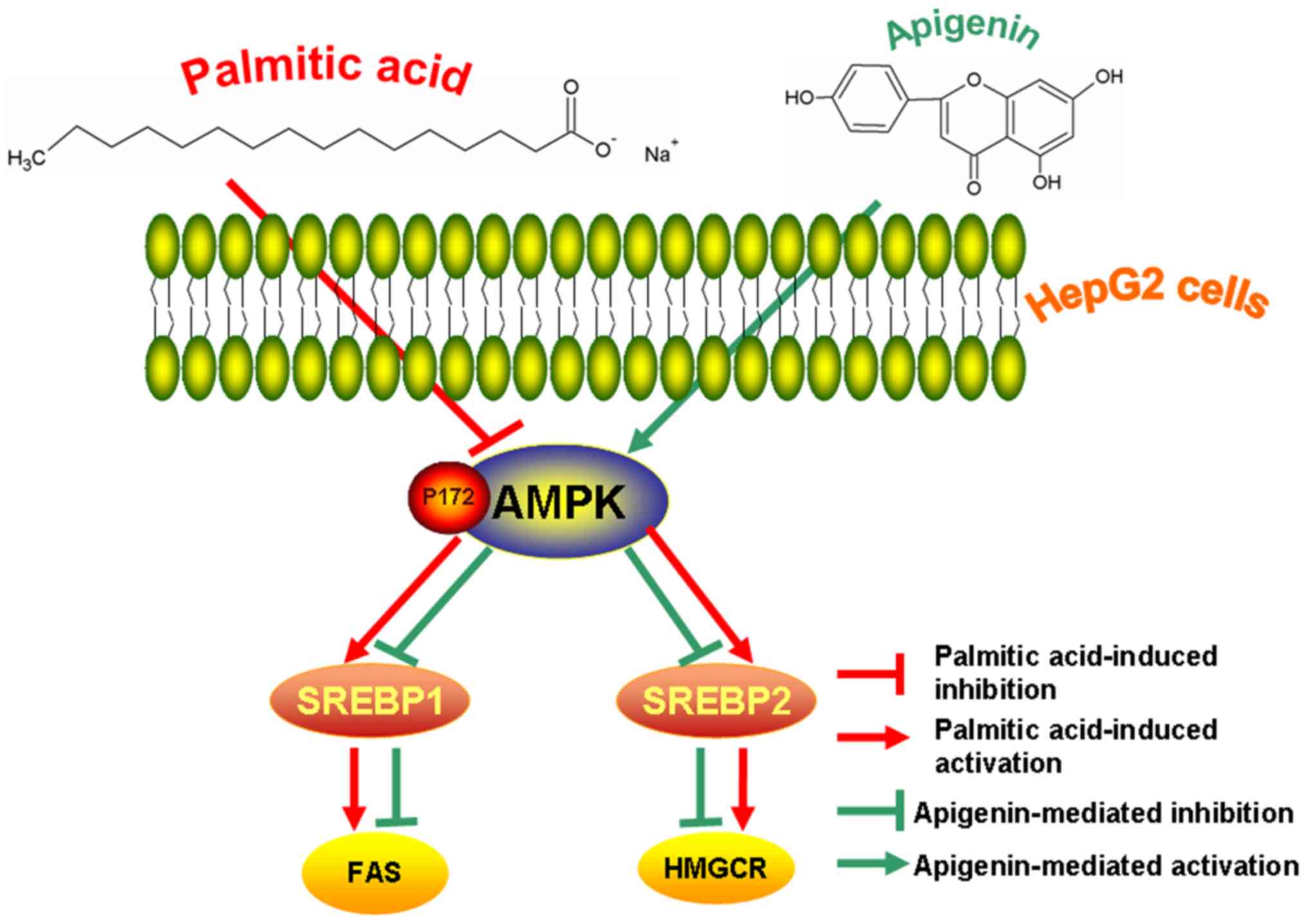|
1
|
Williams JA, Manley S and Ding WX: New
advances in molecular mechanisms and emerging therapeutic targets
in alcoholic liver diseases. World J Gastroenterol. 20:12908–12933.
2014. View Article : Google Scholar : PubMed/NCBI
|
|
2
|
Wan Y, Liu LY, Hong ZF and Peng J: Ethanol
extract of Cirsium japonicum attenuates hepatic lipid
accumulation via AMPK activation in human HepG2 cells. Exp Ther
Med. 8:79–84. 2014. View Article : Google Scholar : PubMed/NCBI
|
|
3
|
Zhang M, Yuan Y, Wang Q, Li X, Men J and
Lin M: The Chinese medicine Chai Hu Li Zhong Tang protects against
non-alcoholic fatty liver disease by activating AMPKα. Biosci Rep.
38:BSR201806442018. View Article : Google Scholar : PubMed/NCBI
|
|
4
|
Ono M and Fujimori K: Antiadipogenic
effect of dietary apigenin through activation of AMPK in 3T3-L1
cells. J Agric Food Chem. 59:13346–13352. 2011. View Article : Google Scholar : PubMed/NCBI
|
|
5
|
Xiao X and Song BL: SREBP: A novel
therapeutic target. Acta Biochim Biophys Sin. 45:2–10. 2013.
View Article : Google Scholar : PubMed/NCBI
|
|
6
|
Shimano H: Sterol regulatory element
binding proteins (SREBPs): Transcriptional regulators of lipid
synthetic genes. Prog Lipid Res. 40:439–452. 2001. View Article : Google Scholar : PubMed/NCBI
|
|
7
|
Wong TY, Lin SM and Leung LK: The flavone
luteolin suppresses SREBP-2 expression and post-translational
activation in hepatic cells. PLoS One. 10:e01356372015. View Article : Google Scholar : PubMed/NCBI
|
|
8
|
Mottillo EP, Desjardins EM, Crane JD,
Smith BK, Green AE, Ducommun S, Henriksen TI, Rebalka IA, Razi A,
Sakamoto K, et al: Lack of adipocyte AMPK exacerbates insulin
resistance and hepatic steatosis through brown and beige adipose
tissue function. Cell Metab. 24:118–129. 2016. View Article : Google Scholar : PubMed/NCBI
|
|
9
|
Lu J, Cheng B, Meng Z, Sun M, Fang B, Li
T, Sun M, Liu M and Guan S: Alliin attenuates
1,3-dichloro-2-propanol-induced lipogenesis in HepG2 cells through
activation of the AMP-activated protein kinase-dependent pathway.
Life Sci. 195:19–24. 2018. View Article : Google Scholar : PubMed/NCBI
|
|
10
|
Lordan S, O'Neill C and O'Brien NM:
Effects of apigenin, lycopene and astaxanthin on 7
beta-hydroxycholesterol-induced apoptosis and Akt phosphorylation
in U937 cells. Br J Nutr. 100:287–296. 2008. View Article : Google Scholar : PubMed/NCBI
|
|
11
|
Tong X and Pelling J: Targeting the
PI3K/Akt/mTOR axis by apigenin for cancer prevention. Anticancer
Agents Med Chem. 13:971–978. 2013. View Article : Google Scholar : PubMed/NCBI
|
|
12
|
Zhu ZY, Gao T, Huang Y, Xue J and Xie ML:
Apigenin ameliorates hypertension-induced cardiac hypertrophy and
down-regulates cardiac hypoxia inducible factor-lα in rats. Food
Funct. 7:1992–1998. 2016. View Article : Google Scholar : PubMed/NCBI
|
|
13
|
Ren B, Qin W, Wu F, Wang S, Pan C, Wang L,
Zeng B, Ma S and Liang J: Apigenin and naringenin regulate glucose
and lipid metabolism, and ameliorate vascular dysfunction in type 2
diabetic rats. Eur J Pharmacol. 773:13–23. 2016. View Article : Google Scholar : PubMed/NCBI
|
|
14
|
Escande C, Nin V, Price NL, Capellini V,
Gomes AP, Barbosa MT, O'Neil L, White TA, Sinclair DA and Chini EN:
Flavonoid apigenin is an inhibitor of the NAD+ ase CD38:
Implications for cellular NAD+ metabolism, protein acetylation, and
treatment of metabolic syndrome. Diabetes. 62:1084–1093. 2013.
View Article : Google Scholar : PubMed/NCBI
|
|
15
|
Poitout V and Robertson RP:
Glucolipotoxicity: Fuel excess and beta-cell dysfunction. Endocr
Rev. 29:351–366. 2008. View Article : Google Scholar : PubMed/NCBI
|
|
16
|
Mayer CM and Belsham DD: Palmitate acid
attenuates insulin signaling and induces endoplasmic reticulum
stress and apoptosis in hypothalamic neurons: The rescue of
resistance and apoptosis through adenosine 5′
monophosphate-activated protein kinase activation. Endocrinology.
151:576–585. 2010. View Article : Google Scholar : PubMed/NCBI
|
|
17
|
Park JY, Kim Y, Im JA and Lee H: Oligonol
suppresses lipid accumulation and improves insulin resistance in a
palmitate-induced in HepG2 hepatocytes as a cellular steatosis
model. BMC Complement Altern Med. 15:1852015. View Article : Google Scholar : PubMed/NCBI
|
|
18
|
Kim J, Lee I, Seo J, Jung M, Kim Y, Yim N
and Bae K: Vitexin, orientin and other flavonoids from Spirodela
polyrhiza inhibit adipogenesis in 3T3-L1 cells. Phytother Res.
24:1543–1548. 2010. View
Article : Google Scholar : PubMed/NCBI
|
|
19
|
Ren K, Jiang T, Zhou HF, Liang Y and Zhao
GJ: Apigenin retards atherogenesis by promoting ABCA1-mediated
cholesterol efflux and suppressing inflammation. Cell Physiol
Biochem. 47:2170–2184. 2018. View Article : Google Scholar : PubMed/NCBI
|
|
20
|
Vock C, Gleissner M, Klapper M and Döring
F: Identification of palmitate-regulated genes in HepG2 cells by
applying microarray analysis. Biochim Biophys Acta. 1770:1283–1288.
2007. View Article : Google Scholar : PubMed/NCBI
|
|
21
|
Zechner R, Zimmermann R, Eichmann TO,
Kohlwein SD, Haemmerle G, Lass A and Madeo F: FAT SIGNALS-lipases
and lipolysis in lipid metabolism and signaling. Cell Metab.
15:279–291. 2012. View Article : Google Scholar : PubMed/NCBI
|
|
22
|
Block MJ: American chemical society.
Chemcycolpedia. 2000:106–107. 2001.
|
|
23
|
Zhang J, Liu D, Huang Y, Gao Y and Qian S:
Biopharmaceutics classification and intestinal absorption study of
apigenin. Int J Pharm. 436:311–317. 2012. View Article : Google Scholar : PubMed/NCBI
|
|
24
|
Altamimi MA, Elzayat EM, Alshehri SM,
Mohsin K, Ibrahim MA, Al Meanazel OT, Shakeel F, Alanazi FK and
Alsarra IA: Utilizing spray drying technique to improve oral
bioavailability of apigenin. Adv Powder Technol. 29:1676–1684.
2018. View Article : Google Scholar
|
|
25
|
Zhai YJ, Guo SS, Liu CH, Yang CF, Dou JF,
Li LB and Zhai GX: Preparation and in vitro evaluation of
apigenin-loaded polymeric micelles. Colloids Surfaces A:
Physicochemical Engineering Aspects. 429:24–30. 2013. View Article : Google Scholar
|
|
26
|
Hardie DG: Minireview: The AMP-activated
protein kinase cascade: The key sensor of cellular energy status.
Endocrinology. 144:5179–5183. 2003. View Article : Google Scholar : PubMed/NCBI
|
|
27
|
Carling D: The AMP-activated protein
kinase cascade-a unifying system for energy control. Trends Biochem
Sci. 29:18–24. 2004. View Article : Google Scholar : PubMed/NCBI
|
|
28
|
Kang MC, Ding Y, Kim EA, Choi YK, de
Araujo T, Heo SJ and Lee SH: Indole derivatives isolated from Brown
alga Sargassum thunbergii inhibit Adipogenesis through AMPK
activation in 3T3-L1 preadipocytes. Mar Drugs. 15:E1192017.
View Article : Google Scholar : PubMed/NCBI
|
|
29
|
Long YC and Zierath JR: AMP-activated
protein kinase signaling in metabolic regulation. J Clin Invest.
116:1776–1783. 2006. View
Article : Google Scholar : PubMed/NCBI
|
|
30
|
Ruderman N and Prentki M: AMP kinase and
malonyl-CoA: Targets for therapy of the metabolic syndrome. Nat Rev
Drug Discov. 3:340–351. 2004. View
Article : Google Scholar : PubMed/NCBI
|
|
31
|
Sun X, Duan X, Wang C, Liu Z, Sun P, Huo
X, Ma X, Sun H, Liu K and Meng Q: Protective effects of
glycyrrhizic acid against non-alcoholic fatty liver disease in
mice. Eur J Pharmacol. 5:75–82. 2017. View Article : Google Scholar
|
|
32
|
Frederico MJ, Vitto MF, Cesconetto PA,
Engelmann J, De Souza DR, Luz G, Pinho RA, Ropelle ER, Cintra DE
and De Souza CT: Short-term inbibition of SREBP-1c expression
reversed dietinduced nonalcoholic fatty liver disease in mice.
Scand J Gastroenterol. 46:1381–1388. 2011. View Article : Google Scholar : PubMed/NCBI
|
|
33
|
Sakakura Y, Shimano H, Sone H, Takahashi
A, Inoue N, Toyoshima H, Suzuki S and Yamada N: Sterol regulatory
element-binding proteins induce an entire pathway of cholesterol
synthesis. Biochem Biophys Res Commun. 286:176–183. 2001.
View Article : Google Scholar : PubMed/NCBI
|
|
34
|
Caballero F, Fernandez A, De-Lacy AM,
Fernandez-Checa JC, Caballeria J and Garcia-Ruiz C: Enhanced free
cholesterol, SREBP-2 and StAR expression in human NASH. J Hepatol.
50:789–796. 2009. View Article : Google Scholar : PubMed/NCBI
|
|
35
|
Sun JH, Liu X, Cong LX, Li H, Zhang CY,
Chen JG and Wang CM: Metabolomics study of therapeutic mechanism of
Schisandra Chinensislignans in diet-induced hyperlipidemia mice.
Lipids Health Dis. 16:1452017. View Article : Google Scholar : PubMed/NCBI
|


















